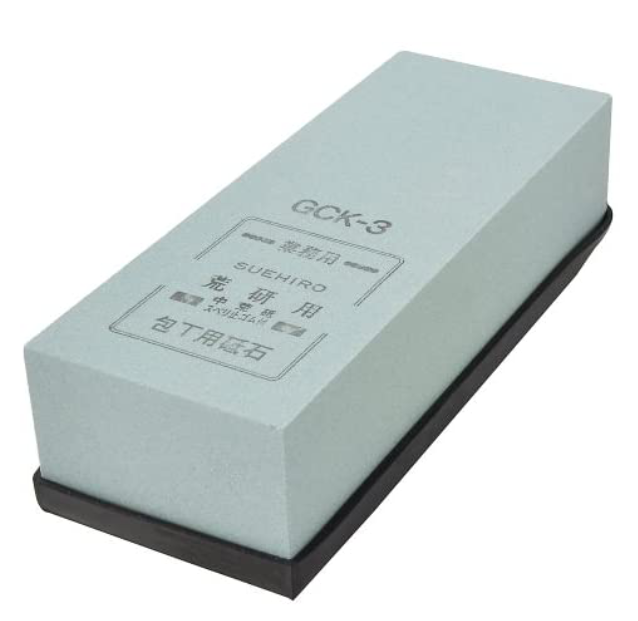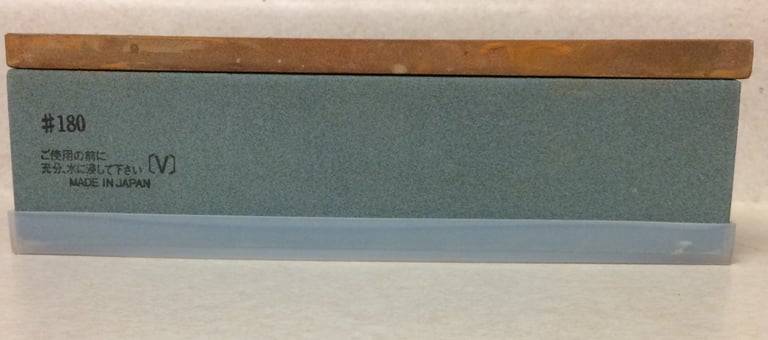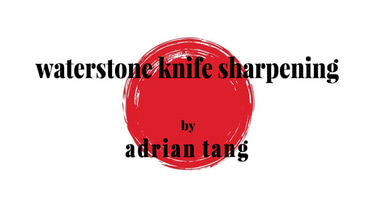Suehiro DX Series GCK-3
Review of the Suehiro 180 grit stone
REVIEWS
If you happened to make it through my first stone review of the Imanishi 400 grit "Latte", this one won't be as lengthy as I will not go into the "how" and "why" I generally prefer one stone over another based on the characteristics that are most important to me. The Suehiro GCK is made of silicon carbide and I expect it to cut very quickly across many steel types. My initial impressions of this stone upon unboxing are very optimistic given that the purpose of this stone is to replace my foundational stone, the Nubatama Bamboo 150 grit.
If you've ever sharpened tools on the Nubatama #150, you'll have a fair understanding why I hold it with such high regard; not only for its sharpening properties and capabilities, but how it has influenced my perspectives on the importance of coarse stones. I feel it's important to note how the 150 Bamboo was crucial in laying the foundation of my sharpening stone progression and selecting every stone following it was meant to work in continuity within the lineups from blade shaping to finishing. The results using the 150 Bamboo were always quick, tidy, and manageable; just about all one could want from using a coarse stone without the unpleasantness, effort to remove deep scratches, or extensive edge degradation when using - say, the ATOMA 140.
It's now apparent for those not familiar with the 150 Bamboo, just how important it was, and how difficult it will be to replace given the limited number of synthetic stone manufacturers creating stones below 220 grit. Factor in the desire to have a larger stone (ex: 205 x 75 x 50mm vs. some that are only 20mm or 10mm in height) and the offerings become even less within the sub-220 grit range.
I've given over a year to finish this review so as to have enough time with this stone for thorough feedback. As the year passed, Suehiro has discontinued this particular stone model number GCK -XX and they are now found with the prefix GCF-XX
The new model number looks promising and likely will have a marginal improvement over the previous formula and recipe. Onward to the review! I'll begin with what I disliked about this stone.
Taking everything into account for what I look for in coarse stones (speed, resistance to dishing, and scratch depth) there are really no major dislikes about Suehiro's DX series. Given its 180 grit rating, it is faster than a 220 grit stone and definitely slower than the 150 grit Nubatama. Perfectly in the middle of the road. I would prefer something that feels and works more aggressively than this one for the shaping work that I do on coarsest stones. Dishing is an issue under long sharpening sessions. It is indeed faster than many offerings at 220 grit, though the start-stop due to taking breaks to flatten are somewhat annoying. This issue mainly applies to thinning and profile work where I can not finish one side of a knife before I need to re-flatten. Although I can set 5 or more knife bevels before even considering to inspect the stone, The speed/dishing compensation is a little soft for my liking. Being a synthetic stone it absolutely behaves and feels like one.


The Suehiro DX needs to be soaked about 20 minutes before beginning a session. Absolutely worth the wait because this stone bites well into all metals and is very quick to release a fine particulate. Only a few passes with a knife, swarf begins showing and buildup of a creamy mud that's more soft and smooth than a heavy gritty sand. Water retention is good once swarf builds up and water control is manageable. Not overly thirsty and the mud plays well on the stone even as it dries while working. Little water is needed to bring it back to life and I never felt as if I had to over saturate the stone to buy more working time between wettings. The mud retention is key in forming a shallow scratch pattern and light pressure while edge sharpening easily creates opportunity to jump straight to a 1000 grit stone. Given the 180 grit rating, any thinning of the blade road will have to be followed up with polishing out the coarse scratches as the texture left behind is too rough to use the knife without refinement. I'm unable to confidently cut ingredients and properly clean/maintain the knife. As with any coarse or ultra coarse stones, stray scratches can creep up the blade road and mar polished or factory finishes. Not the end of the world,, though bear in mind that there will be extra work to do following shinogi work or possibly even after bevel work on a very thick and blunted knife edge.
Since I don't really have any major gripes about this Suehiro I'll move on to some of the positive attributes I have experienced with this stone. The GCK works on a wide variety of steels with ease. I do not have to overthink any aspect of my stone progression. It cuts cleanly and fast. It is extremely tough and handles heavy pressure very well. Stone edges don't crumble at the chamfer, no excessive breakdown of the binder, and very good water retention. The mud does an extremely good job of maintaining a clean sharpening surface. No glazing whatsoever, and the harder I go at cladding, the stone will match my intensity which is a huge benefit.
While I have much enjoyed this stone and does boast fantastic value given its price including overseas delivery, It has more to be desired. I'm not saying that its really lacking in any particular aspect, but it just doesn't quite excel for specifically the heavy volume workloads. The GCK is no slouch and honestly do not recommend to anyone other than for repair work. It has more capability than most readily available coarse stone options and sits very high near the top of my favorites; its just not a Nubatama 150. Likely if I want even higher performance from a stone I will have to look at premium materials such as diamond stones whether they be resin bonded or vitrified. Ultimately, I will be keeping this series in my lineup and hope to acquire the new formula when this one is exhausted.
Thanks for checking it out!


Comparing a used Nubatama 150grit atop the Suehiro GCK-03 180grit
